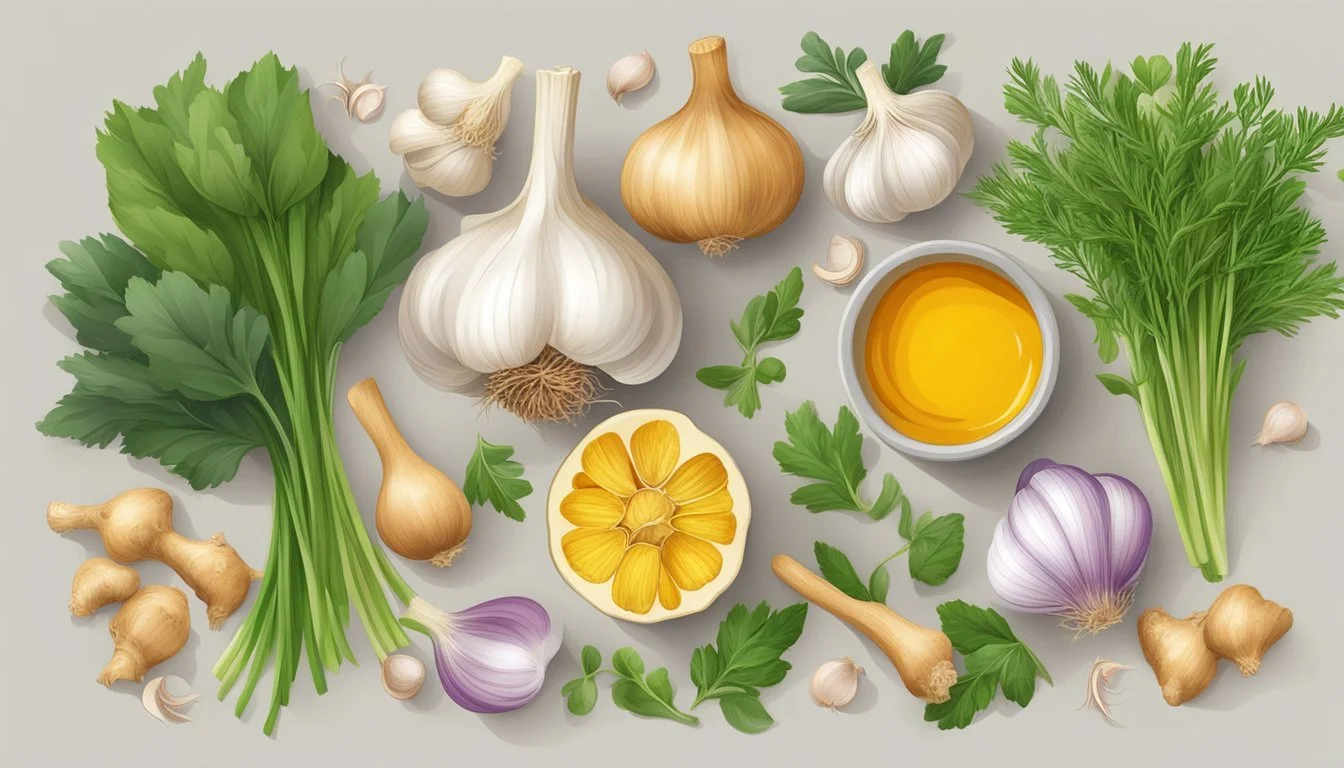Powerful Anti-Inflammatory Foods to Ease Joint Pain and Stiffness
Joint inflammation is a common issue that affects many individuals, often leading to discomfort and restricted mobility. By making informed dietary choices, individuals can potentially alleviate some of the symptoms associated with joint inflammation. Certain foods have been shown to possess anti-inflammatory properties, which can be beneficial in managing joint pain.
Understanding the relationship between diet and joint health is essential for those looking to improve their quality of life. Various nutrients and compounds found in specific foods can help reduce inflammation, supporting overall joint function and health. This article will explore some of the most effective foods that can aid in reducing joint inflammation.
1) Salmon
Salmon is a powerhouse of nutrients beneficial for joint health. Rich in omega-3 fatty acids, it helps reduce inflammation in the body. These fatty acids, specifically EPA and DHA, are crucial in fighting inflammation associated with arthritis.
Regular consumption of salmon can contribute to decreasing joint pain. Studies show that omega-3s found in fatty fish can significantly lessen stiffness and tenderness in joints. Individuals with inflammatory conditions benefit greatly from including salmon in their diet.
Salmon also provides a good source of protein, which is essential for repairing tissues, including those around the joints. Protein aids in maintaining muscle mass that supports and protects joints from further damage.
Eating salmon two to three times per week is recommended. Not only is it beneficial for joint health, but it also supports cardiovascular health and overall well-being.
2) Turmeric
Turmeric, a bright yellow spice often used in curry, is renowned for its anti-inflammatory properties. The active component in turmeric, curcumin, is primarily responsible for these benefits.
Curcumin has been widely studied for its ability to reduce inflammation and help manage conditions like arthritis. Its effectiveness is due to its capacity to lower the levels of inflammatory cytokines and enzymes in the body.
In addition to inflammation, curcumin also possesses antioxidant properties. This can aid in neutralizing free radicals, which contribute to joint pain and swelling.
It's recommended to incorporate turmeric into the diet through various recipes. This can include adding it to soups, stews, and beverages.
For those who might find it difficult to consume turmeric regularly, curcumin supplements are available. However, it's essential to consult a healthcare provider before starting any supplementation.
Combining turmeric with black pepper enhances curcumin absorption, making its anti-inflammatory effects more potent.
3) Ginger
Ginger, a popular spice, is known for its anti-inflammatory properties. It contains compounds like gingerol and shogaol that help reduce inflammation and pain in the joints.
Studies have shown that regular consumption of ginger can aid in managing symptoms of arthritis. It can help alleviate stiffness and improve joint mobility, providing relief to individuals with chronic joint pain.
Ginger can be consumed in various forms, such as fresh, powdered, or as a supplement. Common ways to include ginger in the diet are by adding it to teas, smoothies, or meals. Ginger capsules are also a convenient option for those who prefer supplements.
In addition to its anti-inflammatory benefits, ginger is also known for its antioxidant and anticancer properties. These additional health benefits make ginger a versatile and beneficial addition to the diet.
Experts suggest that consuming up to 4 grams of ginger per day is safe and effective for reducing joint inflammation and pain. This makes it a practical choice for those seeking natural remedies to support their joint health.
4) Olive Oil
Olive oil is a staple in many kitchens and is known for its health benefits, particularly for joint inflammation.
Extra virgin olive oil (EVOO) is rich in polyphenols, which help combat inflammation. These compounds can reduce symptoms of arthritis, making joints feel less stiff and painful.
The monounsaturated fats in olive oil contribute to its anti-inflammatory properties. Regular consumption may help lower levels of inflammation markers in the body.
Incorporating olive oil into one's diet is simple. It can be used in salad dressings, drizzled over vegetables, or used in cooking to retain its nutritional benefits.
Using olive oil as a primary fat source may also improve heart health, providing a dual benefit for those looking to manage joint pain through diet.
5) Cherries
Cherries are known for their impressive anti-inflammatory properties. These small, sweet fruits contain high levels of antioxidants and anthocyanins, which help reduce joint inflammation.
Research has shown that cherries can decrease the chance of gout attacks. This is crucial for those suffering from gout, as the condition causes intense joint pain due to excess uric acid in the blood.
Cherries also help reduce the severity of gout symptoms and lower uric acid levels within a short period. This makes them a valuable addition to the diet of anyone dealing with gout.
In addition to their benefits for gout, cherries may help with other forms of joint inflammation. The flavonoids in cherries contribute to their anti-inflammatory effects, making them comparable to certain non-steroidal anti-inflammatory drugs (NSAIDs).
The benefits of cherries extend beyond joint inflammation. They support heart health, improve sleep, and have various other positive effects on overall well-being. Including cherries in the diet can significantly aid those looking for natural ways to manage joint inflammation.
6) Walnuts
Walnuts are a nutrient-dense food known for their potential to reduce joint inflammation. These nuts are rich in omega-3 fatty acids, specifically alpha-linolenic acid (ALA), which has anti-inflammatory properties.
Studies have suggested that regular consumption of walnuts may help decrease inflammation in the body. This can be particularly beneficial for individuals experiencing joint pain and arthritis.
In addition to omega-3s, walnuts contain other compounds such as polyphenols. These antioxidants play a role in reducing oxidative stress and inflammation, further contributing to joint health.
Consuming walnuts can be easy and versatile. They can be added to salads, yogurt, or simply eaten on their own as a snack. Incorporating a handful of walnuts into a daily diet may offer joint relief and other health benefits.
7) Spinach
Spinach is an excellent vegetable for those looking to reduce joint inflammation. It is packed with nutrients that can significantly benefit joint health.
One key component of spinach is its rich vitamin K content. Vitamin K plays a crucial role in bone health and helps regulate minerals in the bones, which can be beneficial for joints.
Spinach also contains antioxidants such as vitamins A and C. These antioxidants help combat free radicals, which are known to cause inflammation and damage cells, including those in the joints.
Additionally, spinach offers a good dose of magnesium. Magnesium is essential for muscle and nerve function, and it helps maintain healthy bones. This mineral can ease inflammation and reduce joint pain.
Including spinach in the diet is simple. It can be added to salads, smoothies, or lightly sautéed as a side dish. This versatile vegetable not only enhances the flavor of meals but also contributes to overall joint health.
8) Green Tea
Green tea is known for its powerful anti-inflammatory properties.
It contains antioxidants, such as polyphenols and epigallocatechin-3-gallate (EGCG), which help reduce inflammation in the joints.
Research has shown that these compounds can block the production of molecules that cause joint damage, particularly in rheumatoid arthritis.
Green tea can be a beneficial addition to the diet for anyone looking to manage joint inflammation.
Drinking two to three cups a day can provide these anti-inflammatory benefits.
It is a simple and natural way to support joint health without relying solely on medication.
Green tea is not only easy to prepare, but it's also versatile. It can be enjoyed hot or cold and paired with various meals.
Its inclusion in a balanced diet can contribute to overall joint health.
9) Garlic
Garlic is well-regarded for its potential benefits in reducing joint inflammation. Like onions and leeks, it includes a compound called diallyl disulfide. This compound has anti-inflammatory properties that can help mitigate the effects of pro-inflammatory cytokines, which are molecules that promote inflammation.
Regular consumption of garlic can help lessen inflammation and may even aid in protecting cartilage from damage associated with arthritis. Its versatility allows it to be added to various dishes, making it an easy inclusion in daily meals.
Many people find that incorporating garlic into their diets can bring some relief from joint pain. Its natural compounds provide a complementary approach to other treatments aimed at reducing inflammation.
10) Broccoli
Broccoli is a nutrient-rich vegetable that can aid in reducing joint inflammation. It's high in antioxidants, which combat oxidative stress in the body. This makes it a valuable food for those looking to manage joint pain.
Broccoli contains sulforaphane, a compound known to block enzymes linked to joint destruction and inflammation. Including broccoli in the diet provides essential vitamins such as vitamin C and calcium, which are crucial for bone health.
It's also rich in fiber, which supports overall digestive health. The combination of these nutrients contributes to reduced inflammation, potentially easing symptoms associated with arthritis. Adding broccoli to meals can be a simple and effective way to support joint health.
Understanding Joint Inflammation
Joint inflammation occurs when the body's immune system triggers a response in the joints, leading to pain and swelling. This can hinder mobility and significantly impact daily activities.
Causes of Joint Inflammation
Various factors can trigger joint inflammation. Autoimmune diseases like rheumatoid arthritis are a primary cause, where the body's immune system attacks its own tissues. Additionally, infections can lead to septic arthritis, causing severe inflammation. Lifestyle factors, such as obesity and poor diet, also contribute by increasing the stress on joints and causing inflammatory markers in the body to spike. Injury and overuse of joints, as found in athletes or individuals with physically demanding jobs, can also lead to inflammation. Understanding these underlying causes is crucial for managing symptoms effectively.
Symptoms and Diagnosis
Recognizing the symptoms of joint inflammation is key to seeking timely medical intervention. Common symptoms include swelling, redness, and warmth around the affected joint. Pain and stiffness, particularly in the morning or after periods of inactivity, are frequently reported. Decreased range of motion can also occur, making everyday tasks challenging.
Diagnosis typically involves a physical examination, where a healthcare provider assesses visible symptoms. Blood tests can detect inflammatory markers, and imaging tests like X-rays or MRIs might be used to observe joint damage. In some cases, joint fluid analysis may be conducted to identify the presence of infection or crystals, informing the specific cause of inflammation. Accurate diagnosis facilitates effective treatment and management plans.
Nutritional Strategies to Combat Joint Inflammation
Targeting joint inflammation through diet involves prioritizing foods that reduce inflammation and provide specific nutrients. Two key strategies are focusing on anti-inflammatory diet principles and incorporating omega-3 fatty acids.
Anti-Inflammatory Diet Principles
Adopting an anti-inflammatory diet can play a crucial role in managing joint pain. This involves selecting foods known for their anti-inflammatory properties. Cruciferous vegetables like broccoli and kale contain antioxidants that reduce inflammation. Fruits, especially berries, are rich in compounds that combat oxidative stress.
Fish such as salmon and mackerel are excellent sources of anti-inflammatory omega-3 fatty acids. Spices like turmeric and ginger are also known for their inflammation-fighting abilities, thanks to active compounds like curcumin and gingerol. Incorporating these foods can offer substantial benefits for joint health.
Role of Omega-3 Fatty Acids
Omega-3 fatty acids are essential in the fight against joint inflammation. Found abundantly in fatty fish like salmon, sardines, and mackerel, these fats reduce inflammatory markers in the body. They are beneficial for individuals with conditions like osteoarthritis and rheumatoid arthritis.
Plant-based sources of omega-3s, such as flaxseeds and chia seeds, are also valuable. Regular inclusion of these sources helps maintain joint lubrication and can reduce stiffness and pain. For optimum joint health, it's recommended to consume omega-3-rich foods several times a week.






